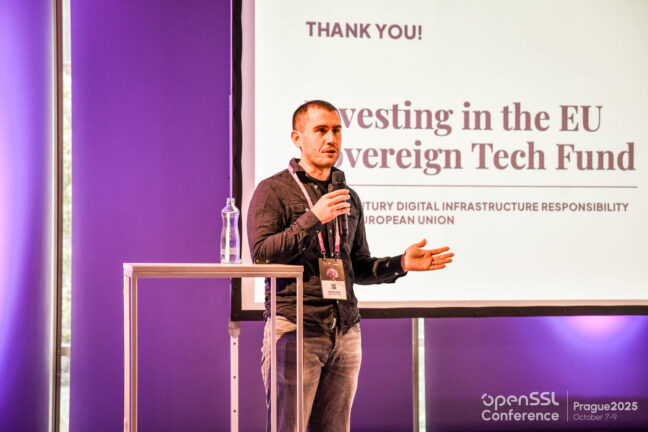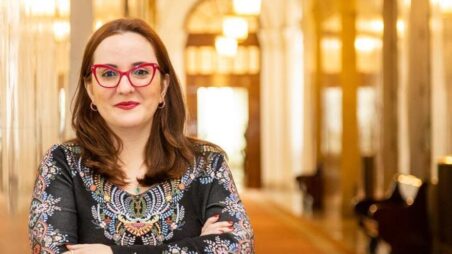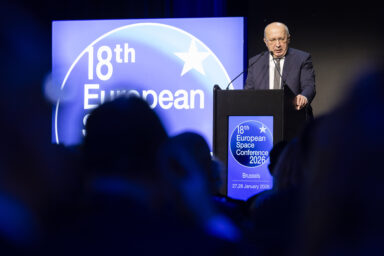Open-source software means freedom, autonomy, and up to €95bn per year to European economy. Nicholas Gates from OpenForum Europe urges the Union to take a leaf from Berlin’s book: Germany’s Sovereign Tech Fund, designed to support the open concept, aims to reduce dependence on American software.
Virtually all modern software depends on open source in one way or another. Yet it remains dramatically underfunded. Open-source software refers to programs that anyone can freely download, use, modify, improve, and share. This openness often makes them more secure, cheaper, and more transparent.
Germany’s pandemic response
However, open source faces a classic economic dilemma, the “free-rider problem”. As anyone can use it free of charge, few are willing to invest in its development and maintenance.
During the Covid-19 pandemic, Germany responded to this issue by creating the Sovereign Tech Fund, a mechanism designed to support open-source software and ensure the technological sovereignty of the country. Nicholas Gates is a policy researcher at OpenForum Europe, a Brussels-based think-tank. In his view, this fund has proven to be exceptionally successful in directing public resources efficiently toward maintaining and securing key open-source infrastructure.
“It simplified the administration of grants and succeeded in getting money directly to developers,” Mr Gates explained at the recent OpenSSL conference in Prague. “In Germany, it has been so successful that it has survived several changes of government,” he added. Now he proposes that this model should expand to the European Union level.
You might be interested
Unlocking resources
Mr Gates points out that the German fund has demonstrated how public money can efficiently maintain and secure the digital infrastructure that underpins modern society. He argues that Europe should elevate this model to the EU level, creating a stable mechanism that connects both public and private sources of funding. “It’s about unlocking resources for development and providing public finance in a way that creates stronger support for open-source projects,” he said.
The economic case for investing in open source is, in Mr Gates’s words, immense. A Harvard Business School study estimates that open source contributes between €65 and €95bn annually to the European Union’s GDP.
“We’re talking about an economic impact significant enough to justify a degree of public investment,” the OpenForum Europe official said. “We should treat open source the same way we treat roads and bridges.”
From software to sovereignty
The arguments, however, go beyond economics. Supporting open-source software also strengthens Europe’s digital autonomy and resilience. This forms the base on which the concept of technological sovereignty rests. The overarching goal is to reduce Europe’s dependence on foreign digital giants.
“We’re proposing targeted investment in open technologies as a way to achieve key policy goals related to autonomy,” Mr Gates explained. Technological sovereignty, one of the stated objectives of the current European Commission, does not mean simply controlling software to him. It means freedom of choice and flexibility. “It’s about autonomy: the ability to make choices, to avoid being locked in with one supplier, to migrate when needed, and to remain resilient in the face of systemic risks,” Mr Gates said.
Open source strengthens sovereignty because it allows users, governments, and companies to take their digital destiny into their own hands. — Nicholas Gates, researcher at OpenForum Europe
The problem of vendor lock-in is familiar to many public institutions. This occurs when an institution’s system runs on software maintained by a single private company, making it extremely costly or complex to switch to another provider. In such cases, the client—be it a government agency or public administration—loses the freedom to choose and becomes dependent on one supplier. “Open source strengthens sovereignty because it allows users, governments, and companies to take their digital destiny into their own hands,” Mr Gates argued.
A European Sovereign Tech Fund?
The OpenForum Europe report, which Mr Gates helped author, recommends that the EU take the German model and scale it up proportionally. “We took the level of investment in the German Sovereign Tech Fund, recalculated it to the EU level, and used that as the lower threshold,” he explained.
The result is a core budget of €350m per year, with a minimum EU contribution of €15m annually. “The unmet demand for funding, however, is much higher,” Mr Gates added. The upper limit would bring us closer to €1bn.” The key is that the fund should be light on bureaucracy and remain politically independent, he said.
For Mr Gates, the stakes could not be higher. “Open source is the ‘invisible neighbor’ that underpins our digital infrastructure,” he said. “If we fail to invest in it, we risk weakening the foundations of our digital society and economy.” His message to European policymakers is clear and urgent: “Open source is not just a tool. It is strategic infrastructure. We should treat it like roads and bridges: as fundamental, shared infrastructure. And we should invest in it accordingly.”











